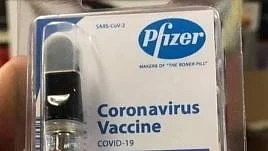In a statement put out by a company spokesperson on Thursday, 22 April, Pfizer said it is in discussions with the central government to bring its vaccines to the India. The US Pharmaceutical giant said is willing to provide its COVID-19 vaccines to India at a discounted ‘not-for-profit’ price.
This comes as India relaxes its regulations on vaccines considering the surge in COVID cases and an acute shortage of vaccines and oxygen supply in the healthcare infrastructure in the country. The Centre said that it was fast-tracking Emergency Use Approvals (EUA) for foreign-produced COVID vaccines that have been granted EUA in other countries.
This is being done in order to expand the number of vaccines available for inoculation in the country.
“During the current pandemic situation worldwide, Pfizer has maintained that its priority would be to exclusively support governments through supply of its vaccine only to governments for their immunisation programmes. This would be our approach in India as well,” said the company statement.
The company said that it remains committed to making the Pfizer BioNTech vaccine for use in India. In terms of pricing, the statement, as shared by Hindustan Times, said that the company wants to enable equitable and affordable access for its COVID-19 vaccine for people around the world including in India and is open to collaborations with the Centre for the same.
“In all our agreements, Pfizer has adopted a distinct pricing structure for high, middle, and low/lower-middle-income countries consistent with our commitment to work towards equitable and affordable access for our COVID-19 vaccine for people around the world,” said the statement.
Pfizer Withdraws Its Application for EUA in India
Pfizer was the first to apply for EUA in India, before the applications of Serum Institute of India (SII) and Bharat Biotech for their respective vaccines. It had, however, withdrawn its application for EUA of its COVID-19 vaccine in India, reports had said on Friday, 5 February.
However, this may change considering that India has opened up its regulations recently to allow parallel clinical trials instead of a local bridging trial, which was where Pfizer had experienced its issues and had withdrawn.
Pfizer and BioNTech on 31 March had announced that the Phase 3 trial of their COVID-19 vaccine on adolescents of ages 12-15 in the US had shown 100 percent efficacy and “robust antibody responses”.
What Has Changed for the Govt?
While giving approval, the government mandated the requirement of post-approval "parallel bridging clinical trial" rather than a "local clinical trial" as per the provisions prescribed under the Second Schedule of the New Drugs & Clinical Trials Rules, 2019.
A bridging clinical trial refers to a trial on a smaller local population, of a product manufactured and tested in a foreign country and its population.
With the new notification, the government mandated a "parallel" bridging trial in which the first 100 beneficiaries of such foreign vaccines shall be assessed for seven days for safety outcomes before it was rolled out for further immunisation programmes within the country.
On Tuesday, 13 April, Russia's Sputnik V became the third vaccine and the first foreign one to get a green light for emergency use in India. Sputnik V’s approval comes after the Centre finally eased the path for vaccines from pharmaceutical companies that have been approved in the US, the UK and European countries, to seek approvals in India.
